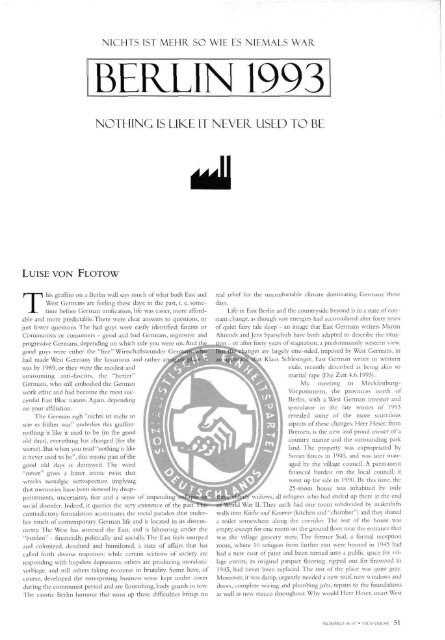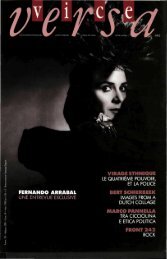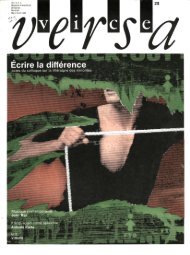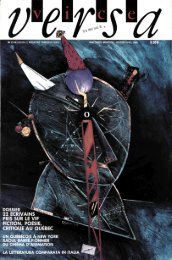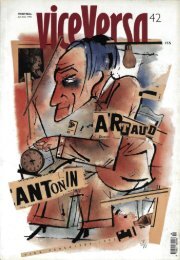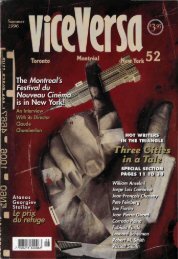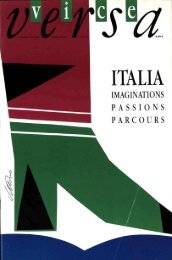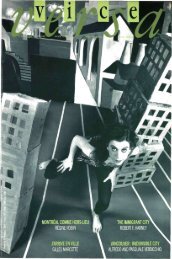N. 46/47 Palomar : voyeur, voyant, visionnaire - ViceVersaMag
N. 46/47 Palomar : voyeur, voyant, visionnaire - ViceVersaMag
N. 46/47 Palomar : voyeur, voyant, visionnaire - ViceVersaMag
You also want an ePaper? Increase the reach of your titles
YUMPU automatically turns print PDFs into web optimized ePapers that Google loves.
LUISE VON FLOTOW<br />
NIGHTS 1ST MEHR SO WIE ES NIEMALS WAR<br />
BERLIN 1993<br />
NOTHING IS LIKE IT NEVER. USED TO BE<br />
This graffito on a Berlin wall says much of what both East and<br />
West Germans are feeling these days: in the past, i. e. sometime<br />
before German unification, life was easier, more affordable<br />
and more predictable. There were clear answers to questions, or<br />
just fewer questions. The bad guys were easily identified: fascists or<br />
Communists or consumers - good and bad Germans, regressive and<br />
progressive Germans, depending on which side you were on. And th.<br />
good guys were either the "free" Wirtschaftswunder<br />
had made West Germany the luxurious and rather ar<br />
was by 1989, or they were the modest and<br />
unassuming anti-fascists, the "better"<br />
Germans, who still embodied the German<br />
work ethic and had become the most successful<br />
East Bloc nation. Again, depending<br />
on your affiliation.<br />
The German sigh "nichts ist mehr so<br />
wie es friiher war" underlies this graffito:<br />
nothing is like it used to be (in the good<br />
old days), everything has changed (for the<br />
worse). But when you read "nothing is like<br />
it never used to be", this mystic past of the<br />
good old days is destroyed. The word<br />
"never" gives a bitter ironic twist that<br />
wrecks nostalgic retrospection implying<br />
that memories have been skewed by disappointments,<br />
uncertainty, fear and a sense ot impendin<br />
social disorder. Indeed, it queries the very existence of the past?<br />
contradictory formulation accentuates the social paradox that underlies<br />
much of contemporary German life and is located in its dissymmetry.<br />
The West has annexed the East, and is labouring under the<br />
"burden" - financially, politically and socially. The East feels usurped<br />
and colonized, devalued and humiliated, a state of affairs that has<br />
called forth diverse responses: while certain sections of society are<br />
responding with hopeless depression, others are producing moralistic<br />
verbiage, and still others taking recourse in brutality. Some have, of<br />
course, developed the enterprising business sense kept under cover<br />
during the communist period and are flourishing, body guards in tow.<br />
The caustic Berlin humour that sums up these difficulties brings no<br />
^<br />
real relief for the unconfortable climate dominating Germany these<br />
days.<br />
Life in East Berlin and the countryside beyond is in a state of constant<br />
change, as though vast energies had accumulated after forty years<br />
of quiet fairy tale sleep - an image that East Germans writers Martin<br />
Ahrends and Jens Sparschuh have both adapted to describe the situa-<br />
- or after forty years of stagnation, a predominantly western view.<br />
^pfeg^^nges are largely one-sided, imposed by West Germans, in<br />
t Klaus Schlesinger, East German writer in western<br />
exile, recendy described as being akin to<br />
marital rape pie Zeit 4.6.1993).<br />
My meeting in Mecklenburg-<br />
Vorpommern, the provinces north of<br />
Berlin, with a West German investor and<br />
speculator in the late winter of 1993<br />
revealed some of the more scurrilous<br />
aspects of these changes. Herr Heser, from<br />
Bremen, is the new and proud owner of a<br />
country manor and the surrounding park<br />
land. The property was expropriated by<br />
Soviet forces in 1945, and was later managed<br />
by the village council. A permanent<br />
financial burden on the local council, it<br />
went up for sale in 1990. By this time, the<br />
25-room house was inhabited by only<br />
jj^ widows, all refugees who had ended up there at the end<br />
foTTd War II. They each had one room subdivided by makeshifts<br />
walls into Kiiche una Kammer (kitchen and "chamber") and they shared<br />
a toilet somewhere along the corridor. The rest of the house was<br />
empty, except for one room on the ground floor near the entrance that<br />
was the village grocer)' store. The former Saal, a formal reception<br />
room, where 10 refugees from farther east were housed in 1945 had<br />
had a new coat of paint and been turned into a public space for village<br />
events; its original parquet flooring, ripped out for firewood in<br />
1945, had never been replaced. The rest of the place was quite gray.<br />
Moreover, it was damp, urgently needed a new roof, new windows and<br />
doors, complete wiring and plumbing jobs, repairs to the foundations<br />
as well as new stucco throughout. Why would Herr Heser, smart West<br />
NUMÉRO J6-<strong>47</strong> • VICE VERSA 51


